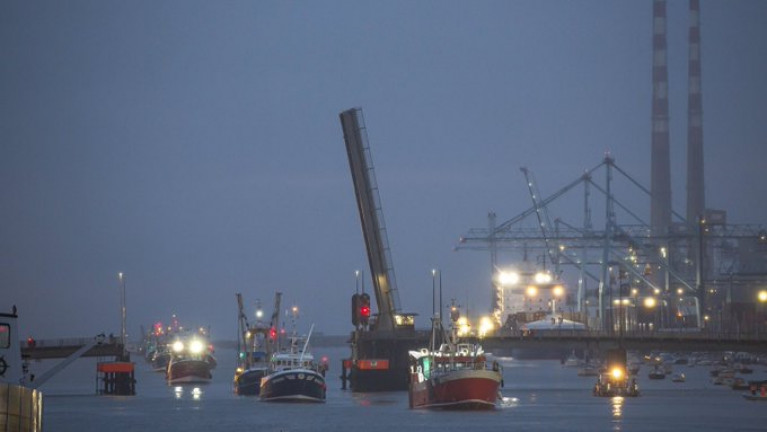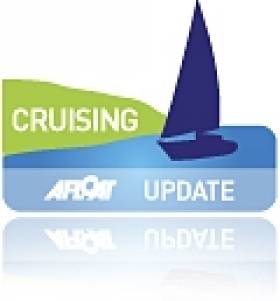Displaying items by tag: Flotilla
Fishermen formed a flotilla of 55 trawlers from all around the Irish coast to gather at the entrance to Dublin Port before dawn prior to travelling up the River Liffey through the East Link Toll Bridge to Sir John Rodgerson's Quay.
The fishermen, reports RTE News, are protesting over quotas cuts, the impact of Brexit and the EU Common Fisheries policy in the second such protest in as many months.
In May, a flotilla of trawlers from the south, southwest and southeast of the country travelled to Cork harbour before holding a rally in the city.
However, fishermen from Donegal, Galway, Cork, Louth, Wexford, Waterford and Dublin are taking part in today's protest, and the action has the support of the country's six main fishing organisations.
The Irish fishing industry is worth over €1 billion to the economy, with 16,000 local people employed in fishing and processing.
Brexit saw the value of the national quota cut by 15%.
More here on this large-scale protest held in the capital.
RYA Scotland Seek Irish Boats For Commonwealth Flotilla
It was hard to miss the big announcement of '100 days to go' for the Commonwealth Games in Glasgow this week but today it is the turn of RYA Scotland as they also reach the '100 days to go' milestone for the Commonwealth Flotilla.
As previously reported, the Commonwealth Flotilla is an official Festival 2014 event and the RYA Scotland team is delighted to be part of the Games experience for spectators and visitors. The event has really gathered pace since the formal launch at the end of February. With over 250 applications having been received already, the response of people looking to get on the water and get involved has been overwhelming.
The Commonwealth Flotilla, which will see the largest number of boats ever assembled on the Clyde, will take place over the weekend of 25-27 July 2014. The morning of Saturday 26 July 2014, the mass Flotilla will make its way on the 17 nautical mile (32km) journey from Greenock to Pacific Quay in Glasgow, adjacent to BBC Scotland and the Glasgow Science Centre. The event is the perfect way to not just promote sailing as a sport, but also to showcase Scotland as a fantastic place to visit and to go sailing.
"Our trip up the Clyde and into Glasgow at the end of July won't just be about the sail itself. If your boat isn't one of the 250 registered to take part then all is not lost as there will be lots of other chances to get involved and enjoy this spectacular opportunity" commented Claire Caffrey, RYA Scotland Marketing Officer.
The RYA Scotland Commonwealth Flotilla is actively seeking boats from England, Wales, Northern Ireland, Ireland and beyond to enter. The Flotilla is not just for Scottish boats. RYA Scotland would like to welcome and are encouraging boats from all over the UK, across Europe, the Commonwealth and beyond to join us for the event of a lifetime. Don't miss out – register before 28th April 2014.
Scotland is one of the best places in the world for sailing – challenging waters, a beautiful and dramatic coastline, intriguing history and places to visit – wrapped with a genuine warmth and hospitality along the way. Combining this with the Commonwealth Games, Homecoming Scotland, the Glasgow 2014 Cultural Programme and the Commonwealth Flotilla event means there really is no better time to visit Scotland and experience all that Scotland and the city of Glasgow has to offer.





























































